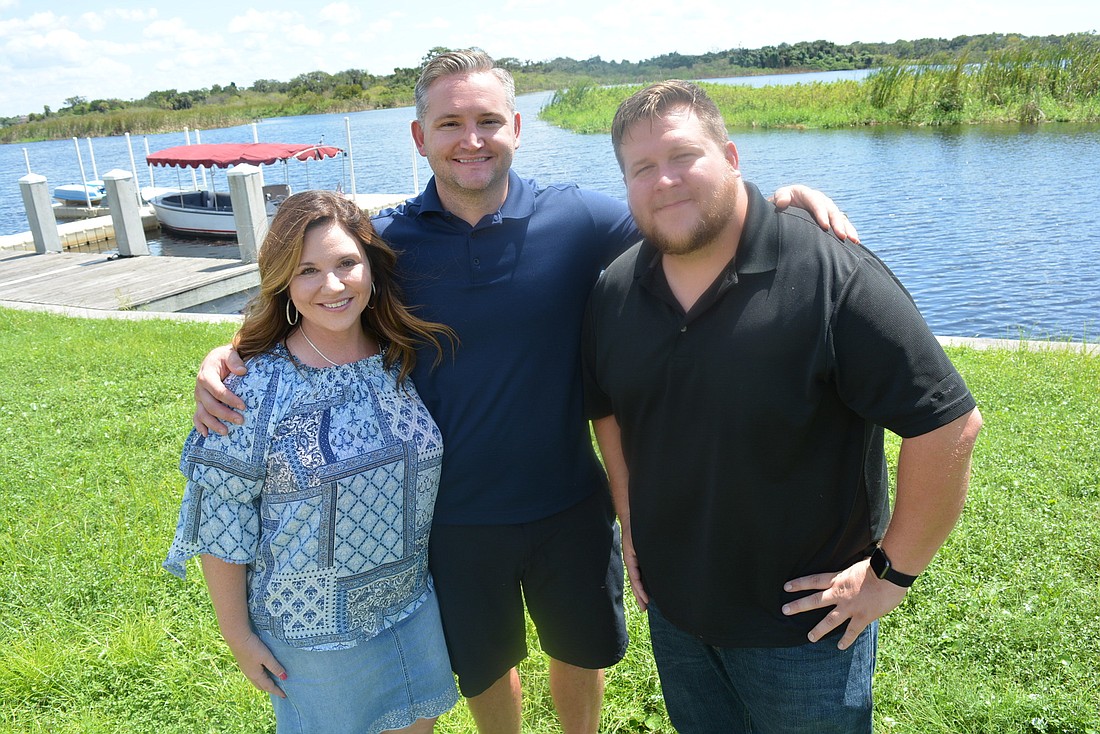- November 15, 2024
-
-
Loading

Loading

Lakewood Ranch’s Patti Katter doesn’t like promises to be broken, especially ones made to military veterans.
In this case, that means she’s trying to raise at least $100,000, so her nonprofit, Camp Comeback, can buy a deep-sea fishing boat for veteran Vladik Zalevskiy. He will contract with veterans-focused nonprofits and use the boat to take other veterans fishing and help them deal with post-traumatic stress disorder and other mental or health issues.
Katter and her husband, Ken, received their Summerfield home in October 2014 for free from Building Homes for Heroes, a
nonprofit that provides mortgage-free homes for soldiers who were injured while serving in Iraq or Afghanistan. Ken Katter suffered head trauma and other injuries during his 15-month deployment to Iraq from 2006-2007. Patti Katter said having their home has been a “huge financial relief” and provided peace of mind for their future.
She wants to pay that service forward.
“Somebody gave us a home,” Katter said. “To furnish a boat, it’s going to help countless veterans.”
Zalevskiy, a North Port resident who works in East County as a neuromuscular therapist at Massage Therapy Connections, has always found fishing to be comforting but especially so after returning from five years of service with the U.S. Marines. He served two tours in Iraq — one in 2003 and another in 2005 — with the Assault Amphibian Battalion.
He said after the war, he was “jumpy” and didn’t trust people. Fishing gave him an escape from the war raging in his mind.
Patti Katter was present when a businessman promised to buy him a boat more than once. When the man broke that promise, she became determined to right it.
“It’s really upsetting to me when that happens,” Patti Katter said. “I’ve seen so many people [and] organizations say they’re going to do something for a veteran, and they don’t follow through. I felt like it was the right thing to do. If it were my husband, I would hope someone would come in and do the right thing.”
Katter’s mission to help veterans in crisis started in 2008 in Womack Hospital in Fort Bragg, N.C., when Ken was in the Warrior Transition Battalion, a group for soldiers recovering from injury or illness. There, she saw a veteran named Joey Hart crying on the hospital floor.
“People were stepping around him in the hospital,” Katter said.
Katter approached and asked what was wrong. Hart said he was waiting for his pain medication. Katter helped get him what he needed, and they ended up staying in touch for years. Hart, who was sometimes suicidal, would call whenever he needed to talk. When he called suicidal again in 2012, Katter arranged for him to be admitted to an inpatient clinic. He thanked her and asked her to “please keep helping veterans.”
“That was our last conversation,” Katter said, noting she stayed on the phone until the Veterans Affairs van came to pick him up. “He said, ‘When I’m out of here, I’m going to help veterans too.’ But he just couldn’t escape his demons.”
Hart checked himself out early and overdosed on painkillers. Katter was devastated but used the moment to inspire more change. Since then, she has volunteered with veteran-focused nonprofits, such as Wounded Warrior Project and the Elizabeth Dole Foundation.
“Anytime I hear a veteran wants help, I help him,” Katter said. “When I heard about Vladik, it reminded me about the part Joey wanted to help veterans.”
Katter said she knows the good Zalevskiy’s work will do, but she needs help with fundraising efforts and hopes serious volunteers will step forward to help plan fundraising events and campaigns or even spearhead fundraising efforts.
Although $100,000 is a big goal, she believes it is attainable. For example, the amount could be raised if just 100 businesses donated $1,000 each.
Already with Katter’s help, Zalevskiy has taken about five veterans on a four-day boating trip in May in Marathon. They rented a boat, and Zalevskiy took the group snorkeling, free diving, spearfishing, fishing and wake boarding.
Sarasota’s Aaron Barnes was one of them. After time at war, hyper-vigilance had become a way of life, and it was exhausting.
He served with the U.S. Army from 2009 to 2017 but did combat tours in Afghanistan from 2011-2013. He, like many other combat veterans, struggled to re-integrate into society. Familiar places were different, and so were the people. He felt isolated.
“[The fishing trip] gave me an opportunity to open up, to have the stress leave,” Barnes said. “It makes you want to live again. It makes you feel alive.”
With an instinctual bond with other veterans, Barnes felt safe.
That’s the type of experience Katter and Zalevskiy hope to create for more veterans.
“It’s exciting to see other veterans experience new things,” Zalevskiy said. “It’s pretty peaceful once you get out there [on the water].”